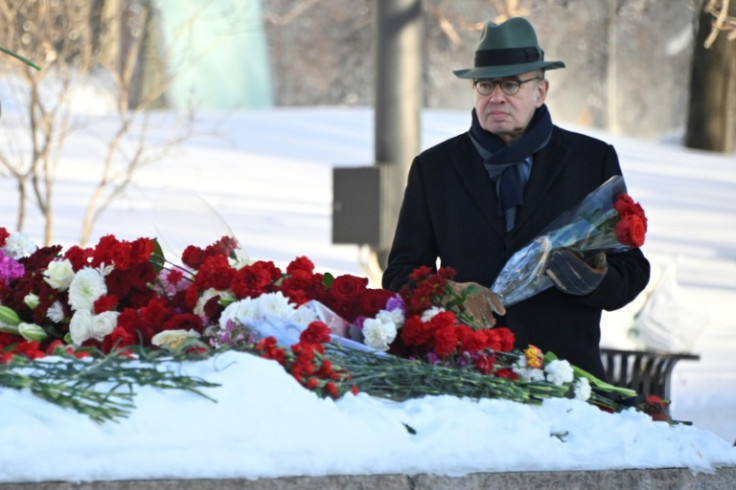Navalny Tributes Paid At Moscow's 'Wall Of Grief'

Dozens of Russians, closely watched by police, left flower tributes at a Moscow monument on Monday to honour the memory of Alexei Navalny despite hundreds of arrests in the days since the opposition icon's death was announced.
Some shed tears as they put wreaths down at the "Wall of Grief" monument to people who died during Soviet-era repression.
Police did not intervene as they have in previous days since Navalny's death in an Arctic prison camp was announced on Friday.
Mourners have laid flowers in memory of Navalny at monuments to victims of Soviet-era repression across Russia with many arrests.
Nearly 400 people have been detained and at least 150 sentenced to short prison terms in the three days after the death was made public, rights groups said.
People have been going to two Moscow shrines. Many lined up to leave their tribute at the "Wall of Grief".
Women carried red carnations through piles of snow to the monument. "One for all," read one note.
Several ambassadors, including France's envoy Pierre Levy, also went to the "Wall of Grief" opposite the Lubyanka building that was the headquarters of the KGB intelligence police in Soviet times and now houses the FSB modern-day equivalent.
"Alexei Navalny lives on in our memory, he is a shining light in our lives," said 54-year-old paramedic Larissa.
"We honour his memory and we will continue his work," she added.
Alexandra, 21, said she had been nervous about going to the shrine after seeing social media videos of the arrests.
"On the first two days, I did not stop crying. I am angry," she said.
"Even if he was in prison, if he had been taken into the Arctic circle, he was still alive. It is as though there was still hope," added the young woman who said she had attended rallies where Navalny had spoken.
"It is the kind of person you want to follow and people followed him."
Sixteen-year-old Konstantin said he became interested in politics after hearing about Navalny five years ago.
"I have followed his activities for all these years. The news of his death, or rather his assassination, on February 16 shocked me of course."
"He showed me that politics is not the boring stuff we see in the newspapers," added the teenager.
"He was a rock star of Russian politics."
Having risen as an anti-corruption campaigner, Navalny became the most virulent critic of President Vladimir Putin.
After recovering from one poisoning attempt that plunged him into a deep coma, he returned to Russia where he was jailed for 19 years for extremism, embezzlement and other charges he said were political fabrications.
The detention and the unclear circumstances surrounding death of the charismatic Kremlin opponent have struck a nerve among supporters who say they face growing repression.
"For millions of Russians, he was a kind of hope, and we don't know who will be the new hope," said Elizaveta, a 47-year-old who went to the "Wall of Grief" in dark glasses, nervously smoking a cigarette.

© Copyright AFP 2024. All rights reserved.











